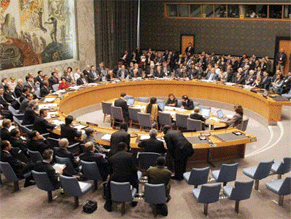|
World Jewish News

United Nations Security Council
(photo by wericampaign.files.wordpress.com)
|
Israel: Embargo Iran oil, even without UN okay
22.02.2010, Israel and the World Prime Minister Benjamin Netanyahu called on Monday for an immediate embargo on Iran's energy sector, saying the United Nations Security Council should be sidestepped if it cannot agree on the move.
Iran's uranium enrichment, in defiance of several rounds of Security Council sanctions, has spurred world powers to consider tougher diplomatic measures, against the backdrop of threatened military action by Israel as a last resort.
Netanyahu told foreign Jewish leaders that if the world "is serious about stopping Iran, then what it needs to do is not watered-down sanctions, moderate sanctions ... but effective, biting sanctions that curtail the import and export of oil into Iran."
"This is what is required now. It may not do the job, but nothing else will, and at least we will have known that it was tried. And if this cannot pass in the Security Council, then it should be done outside the Security Council, but immediately."
Many Western diplomats believe that China, along with fellow veto-wielder Russia, would oppose sanctions targeting Iran's energy sector. Proposed sanctions for now focus on Iranian government assets like the Revolutionary Guard Corps.
Iran, the world's fifth-largest oil exporter, says its uranium enrichment is for peaceful energy needs. But the fierce anti-Israel rhetoric from Tehran and threats of Israeli military action have stirred fears of a regional war.
Netanyahu made no reference in his speech to the possibility that Israel would try to attack Iran's nuclear sites.
Iran earmarks sites for 10 nuclear enrichment plants
Iran has earmarked potential sites for new nuclear enrichment plants and construction of two of them could begin this year, a nuclear energy official said on Monday.
"We have earmarked close to 20 sites and have passed the report on those to the president, however, these sites are only potential," Ali Akbar Salehi, head of the Atomic Energy Organization, was quoted as saying on news agency ISNA.
"We should begin the construction of two enrichment sites next year ... In the two new sites, we plan to use new centrifuges."The next Iranian year begins on March 21.
Iran announced plans in November to build 10 new enrichment plants to match its existing Natanz complex. The announcement came as the United States and its allies hoped to reach an agreement for Iran to enrich uranium abroad.
Washington fears Iran's nuclear energy programme will allow Tehran to develop nuclear weapons. Iran denies any such intention and says it only wants to generate electricity.
Salehi said President Mahmoud Ahmadinejad would announce on April 9 what kind of centrifuges are to be used at the new sites.
The United States and its allies hope to get new United Nations sanctions imposed on Iran in the coming weeks over its continued enrichment work.
The head of U.S. Central Command, General David Petraeus, told NBC's "Meet the Press" on Sunday that the United States is placing its efforts to thwart the Iranian nuclear program on a "pressure track."
Petraeus said that he thought "that no one at the end of this time can say that the United States and the rest of the world have not given Iran every opportunity to resolve the issues diplomatically."
"That puts us in a solid foundation now to go on what is termed the pressure track," the U.S. general said, adding that "that's the course on which we are embarked now."
Haaretz.com
|
|
